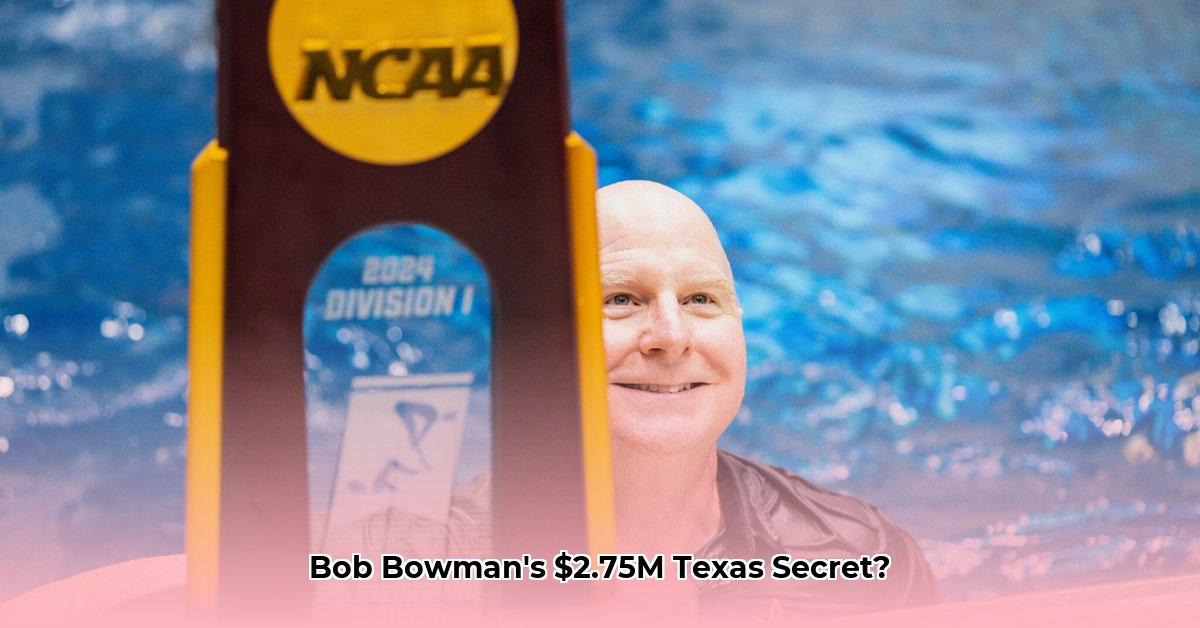
Bob Bowman's Multi-Million Dollar Contract: A Deep Dive into Collegiate Coaching Compensation
Bob Bowman's recent $2.75 million contract with the University of Texas has sparked considerable discussion within the collegiate swimming community and beyond. While a precise net worth calculation remains elusive, this substantial agreement provides valuable insight into the evolving financial landscape of elite collegiate coaching. This article analyzes the contract's details, its implications for collegiate swimming, and broader trends in athletic compensation.
Breaking Down the Texas Contract: Beyond the Headline Figure
The $2.75 million figure, spanning 6.5 years, represents a comprehensive compensation package. It's not solely a base salary; it incorporates performance-based incentives directly tied to the success of both the men's and women's swimming programs. This approach signifies a strategic shift towards holistic program development, rewarding success across all aspects of the athletic department. How does this approach compare to similar contracts in other major collegiate sports? Further research is needed to fully contextualize this unique deal.
| Compensation Component | Estimated Value (Over 6.5 Years) |
|---|---|
| Base Salary | Approximately $2.2 Million |
| Performance-Based Bonuses | Approximately $550,000 |
| Total Estimated Compensation | $2.75 Million |
Beyond the core financial components, the contract likely includes additional perks, such as a car allowance, relocation assistance, and potentially endorsement opportunities. These supplementary benefits underscore the University of Texas' commitment to securing Bowman's expertise and building a lasting legacy within their swimming program.
The Broader Context: Implications for Collegiate Athletics
Bowman's contract reflects a growing trend in collegiate athletics: the escalating financial investment in top coaching talent. A comparison to previous coaching salaries at the University of Texas, and those at similar institutions, reveals a significant increase, highlighting the rising value placed on experienced coaches capable of sustaining long-term success. This raises several crucial questions: Is this level of compensation sustainable long-term? Will other universities respond by increasing their coaching salaries, potentially setting off a "salary arms race"? And, most critically, how will rising coaching costs impact resource allocation across the broader athletics department and other sports programs?
The six-and-a-half-year duration of the contract adds another layer of complexity. This length of commitment potentially reflects a strategic long-term vision from the University of Texas, emphasizing Bowman's continued contributions beyond immediate wins. However, it also carries inherent risk, impacting long-term budget planning and succession planning.
Bowman's Impact: A Ripple Effect Beyond the Balance Sheet
The true significance of Bowman's compensation package extends beyond its monetary value. It underscores a profound shift in the professionalization of collegiate coaching. It indicates a growing recognition that achieving and maintaining competitive excellence demands significant financial resources and strategic investments in elite coaching talent. The downstream implications are substantial, potentially influencing recruitment strategies, program funding, and the overall long-term sustainability of collegiate swimming.
This significant investment necessitates critical consideration of several interconnected factors. Could the focus on high salaries strain athletic department budgets in the long run? How will this trend affect smaller athletic programs with more limited resources? Might it indirectly impact recruiting practices and athlete well-being? These questions require ongoing analysis and further research.
Negotiating Competitive Coaching Contracts: Key Lessons from Bowman's Deal
Bob Bowman's contract provides a valuable case study for coaches navigating contract negotiations. His deal highlights the necessity of a comprehensive approach that encompasses not just base salary but also performance-based incentives, supplementary benefits, and a long-term vision for program development.
Key Takeaways:
- Comprehensive Compensation: Success hinges on securing a comprehensive package that includes base salary, performance bonuses, and additional benefits.
- Holistic Program Building: Demonstrate an ability to build sustainable, successful programs across the board, not just focus on short-term wins.
- Long-Term Vision: Articulate a clear vision for the program's future growth and sustainability.
- Legal Counsel: Secure legal counsel to navigate complex contract negotiations and ensure your interests are protected.
This high-profile contract provides valuable insights into the changing financial landscape of collegiate athletics and offers crucial lessons for both aspiring and established coaches seeking to secure competitive compensation packages. The implications extend far beyond the individual coach, shaping the future of collegiate sports programs and impacting the athletic experience for student-athletes.